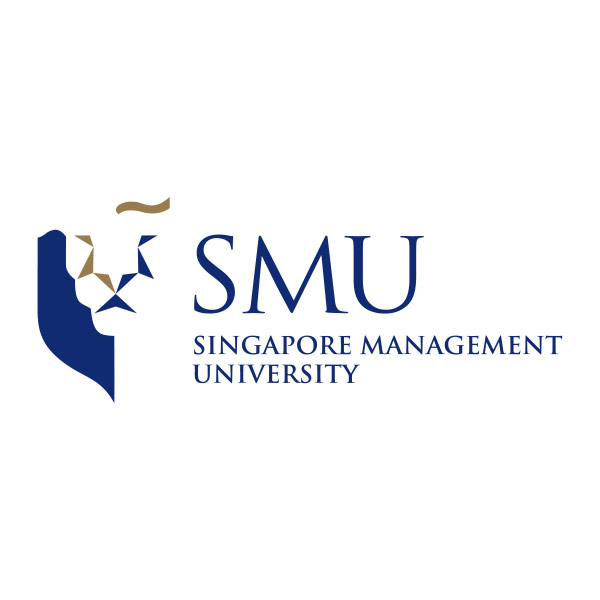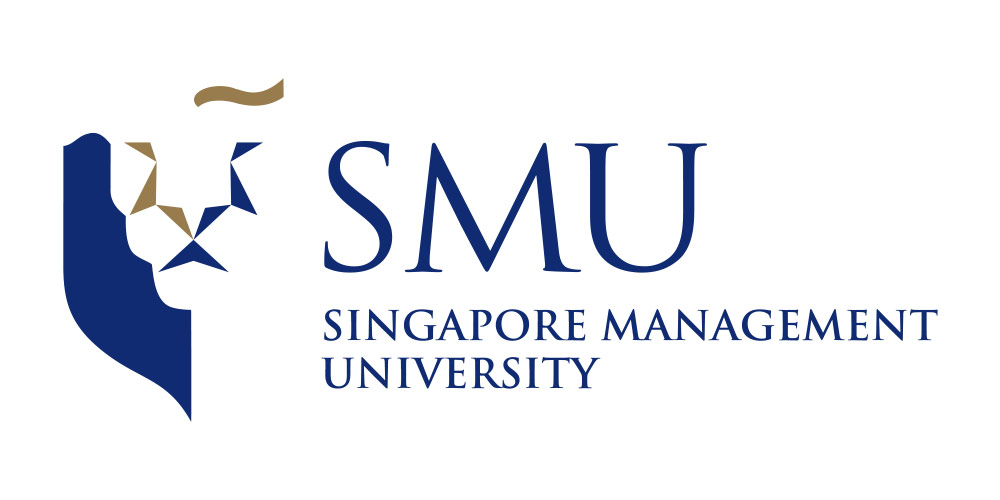Singapore Management University (SMU) is a premier, internationally recognised university reputed for world-class research and distinguished teaching. We are committed to providing learners with an interactive, participative and technologically-enhanced learning experience through our hallmark interactive seminars, SMU-X experiential learning and technology-enhanced learning (TEL).
In order to achieve SMU’s vision to deliver transformative education for a new generation of graduates (Vision 2025), SMU seeks to develop broadly educated individuals, with depth of knowledge in selected domains, and workplace capabilities required to thrive in the 21st century through a clear identification and articulation of what our desired graduate learning outcomes are. These graduate learning outcomes refer to the university-wide highest learning goals that are important to the university for all undergraduates, regardless of their discipline areas.
SMU’s TEL Framework
SMU’s TEL framework is based on an educational philosophy of our conception of an undergraduate – first, as individuals with different learning needs; second, as social beings who learn through interaction and collaboration; and third, as members of a community whose experiential learning should lead to knowledge production, innovation and benefit the community. Thus, SMU’s TEL framework comprises the use of technology to enhance:
- Personalised learning which caters to individuals with different learning needs and progression, and provides learners with prescriptive feedback and choices to aid them along their unique learning paths.
- Collaborative and interactive learning which enhances collective and social experience of learning.
- Experiential Learning through innovation and knowledge production; and Participatory learning and action which involves students using technology in order to effectively address a problem pertaining to a business, community or societal need.
Personalised Learning
 [Source: Screenshots of STARS Cafe App]
[Source: Screenshots of STARS Cafe App]
For personalised learning, digital tools such as self-paced learning objects, interactive and immersive games and simulations are designed by faculty members to empower students to pace and monitor their own learning to attain proficiency. One example would be the School of Social Sciences’ mobile app, STARS Cafe. This single-player mobile game was developed for Research Methods courses to teach concepts of sample/effect size, power and Type I & II errors to allow students to learn how sample size and effect size can influence their ability to detect reliable effects in different scenarios.
 [Source: Screenshots of Competency Heatmap and Student Competency Acquisition Report in CAS]
[Source: Screenshots of Competency Heatmap and Student Competency Acquisition Report in CAS]
In the area of learning analytics, the School of Information Systems has also developed learning analytics tools such as the Competency Analytics System (CAS), which maps course competencies to student assessments, presenting data of the levels of competency acquisition for individual students as well as for class/cohorts of students. The CAS supports personalised learning by providing an individual dashboard that enables each student to visualise clearly the extent to which the competencies tested in the assessment have been acquired and where they stand with respect to the cohort.
Collaborative and interactive learning
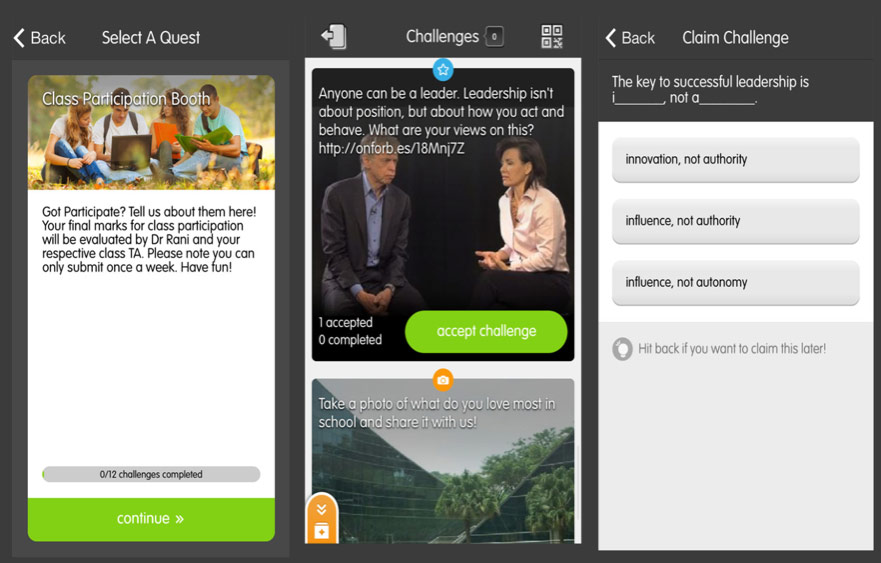 [Screenshots of GameLead app]
[Screenshots of GameLead app]
In the area of collaborative and interactive learning, team-based games are designed by faculty members to enable a collective and social experience in which students engage in a common task, exchange ideas and co-construct knowledge. An example of a collaborative game is Lee Kong Chian School of Business’ award-winning app, GameLead . This gamification app was developed for the Leadership and Team Building course to facilitate collaboration, reflection and discussion among students. Students are given weekly tasks on topics in leadership and team building such as viewing videos on exemplary leaders, uploading and contributing photos of team activities and answering questions for reflections and insights. Students’ online reflections and discussions are used as part of in-class discussions.
Experiential Learning: Learning through innovation and knowledge production, and Participatory learning and action
 [Screenshots of Mind the Drone app]
[Screenshots of Mind the Drone app]
In the area of experiential learning, a single-player virtual reality simulation, Mind the Drone app was developed for the School of Law. Through the eyes of the plaintiff, the app aims to provide an immersive virtual learning environment for students to learn to apply tort legal principles to real-life situations and circumstances. Students interact with the items and people in the case through eye gaze technology to select and classify relevant evidence in order to make an informed determination of tortious liability.
1 The GameLead app won the Social Sciences and MBA Discipline Award and clinched a silver award in the ICT Tools for Learning & Teaching category at the distinguished Wharton-Quacquarelli Symonds Stars Reimagine Education Conference & Awards 2015.
2 This game was featured on Channel 8, News Tonight 晚间新闻【科技一点通】as part of how VR Technology is used in education.
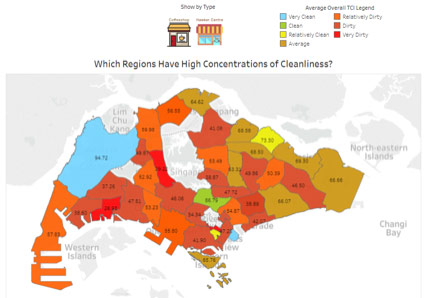 [Screenshot: Cleanliness Toilet Index extracted from http://toiletstatistics.com]
[Screenshot: Cleanliness Toilet Index extracted from http://toiletstatistics.com]
For learning through innovation and knowledge production; and participatory learning and action, students learn through sequential reflections, research and actions in the community. In one of the SMU-X courses, students collaborated with the World Toilet Organisation to develop a Cleanliness Toilet Index as part of their introductory statistics course. The students used data analytics and visualisation tools (e.g. Tableau) to collate and analyse data. They produced graphs and heat maps to raise awareness and encourage the community to do more to maintain Singapore's reputation as one of the cleanest cities in the world.
EDGE: EDTech Greenhouse
In response to SMU’s Blue Ribbon Commission on Undergraduate Education’s (BRC-UG) recommendation for a systematic process to develop key TEL projects with wide and impactful application across SMU, an EdTech Greenhouse (EDGE) was set-up to actively identify innovative projects initially developed for research purposes and scaling them for campus-wide use by making relevant connections across subject disciplines, faculty development, technology enhancement and alignment to our graduate learning outcomes. This initiative leverages cross-functional teams from Centre for Teaching Excellence (CTE), Integrated Information Technology Services (IITS), Schools, and the Living Analytics Research Centre (LARC).
One project arising from EDGE is the Competency Analytics System (CAS), which was initially developed by a School of Information Systems Instructor as part of a research project. Through EDGE, the team aims to scale the use of CAS across various disciplines to map course competencies and the graduate learning outcomes to student assessments, presenting data of the levels of competency acquisition for individual students as well as for class/cohorts of students. These competencies will be tracked throughout the students’ learning journey in SMU.
ASEAN University Network Technology Enhanced Personalised Learning (AUN-TEPL) Thematic Network
SMU, together with co-leads Mahidol University and University of Malaya, have established the AUN Technology Enhanced Personalised Learning (AUN-TEPL) Thematic Network with the proposed mission to foster collaboration amongst ASEAN+3 universities to improve student success through technology-enhanced personalised learning.
The three key objectives of the proposed Thematic Network are as follows:
- To build capacity amongst participating universities to enhance personalised learning through technology in their respective universities
- To serve as a platform for universities to increase collaboration in the area of technology-enhanced personalised learning
- To promote technology-enhanced personalised learning as a research area amongst interested researchers
Professional Development and Support
The Centre for Teaching Excellence (CTE) and the Integrated Information Technology Services (IITS) provide programmes and platforms to support the University in its TEL strategy and build faculty members' capacity in the following areas:
Professional Development and Support
The Faculty Development Programme aims to enhance faculty members' pedagogical knowledge and help them gain insights into the values of the profession. TEL-related initiatives include:
(a) Blended learning workshops and TEL Lunchtime Series
 [Photo: Blended Learning workshop and TEL Lunchtime Series conducted by CTE and co-facilitated with faculty Members]
[Photo: Blended Learning workshop and TEL Lunchtime Series conducted by CTE and co-facilitated with faculty Members]
CTE partners faculty advocates to co-facilitate sessions such as the Blended Learning workshop and TEL Lunchtime series. Through such workshops, faculty members learn advanced skills of using educational technology tools to enable higher order thinking skills and transform learning, using the Bloom’s digital taxonomy and Substitution-Augmentation-Modification-Redefinition (SAMR) model; as well as to create community of inquiry (COI) and assess learning, online. Faculty members also learn to create digital content with third-party educational technology tools. Customised workshops and faculty consultations on integrating TEL in course design are also available upon request.
(b) Technology-enhanced Learning (TEL) Grant
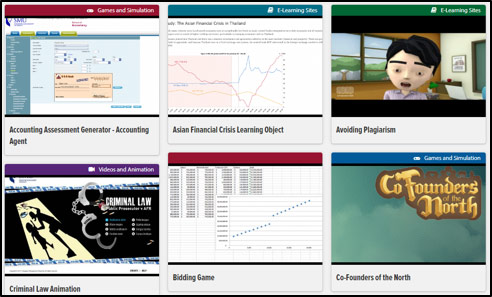 [Screenshot: CTE Projects Page extracted from https://cte.smu.edu.sg/projects]
[Screenshot: CTE Projects Page extracted from https://cte.smu.edu.sg/projects]
The SMU TEL Grant is a competitive, annual funding with project proposals reviewed by either the Pedagogies and Technology-enhanced Learning (PTEL) Workgroup or the Faculty Advisory Committee for Teaching and Learning (FACTL) to ensure sound alignment to learning objectives and to steer projects with the potential for wider application across SMU.
The TEL Grant will comprise of three types of funds to support different target applicants, namely the Subscription Fund, Exploration Fund and the Incubation Fund:
Subscription Fund
The Subscription Fund aims to support faculty members who may wish to try out existing third-party applications and digital textbooks/platforms for their course. This would include subscription-based 3rd-party online applications (e.g. Classroom Responsive Systems, Interactive Video platforms) with the possible intent to integrate with Integrated Information Technology Services (IITS) to scale for campus-wide adoption.
Exploration Fund
The Exploration Fund aims to support faculty members who wish to experiment or innovate through the development of a unique TEL solution at the course-level. This would include pedagogical projects involving the use of more sophisticated levels of technology (e.g. Artificial Intelligence, Learning Analytics, and Virtual/Augmented/Mixed Reality) and innovative solutions (e.g. games and simulations).
Incubation Fund
The Incubation Fund aims to support faculty members linked to projects identified with the potential to scale campus-wide and beyond. This fund supports the translation of a prototype or proof of concept, through enhancements and further testing based on user requirements and feedback, to integration to existing IT systems (e.g. eLearn learning management system) as part of the proposed EdTech Greenhouse model.
Examples of projects supported by CTE TEL funds are found at this link: https://cte.smu.edu.sg/projects]
(c) Communities of Practice
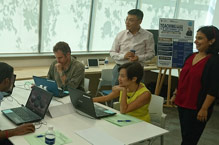 [Photo: Learning Innovation Festival]
[Photo: Learning Innovation Festival]
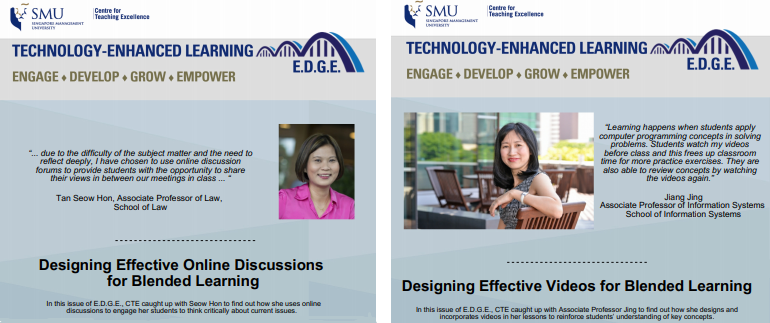 [Screenshot: TEL e-bulletins]
[Screenshot: TEL e-bulletins]
Faculty members learn and explore effective teaching practices with their peers through various platforms (e.g., events such as Learning Innovation Festival, Active Learning Workshops) and through online resources such as e-bulletins. The e-bulletins profile faculty members who have been successful in using educational technology tools to engage learning, with topics such as effective online discussions for reticent students, videos for flipped learning, and adaptive learning for diverse needs.
Platforms and Learning Analytic Tools
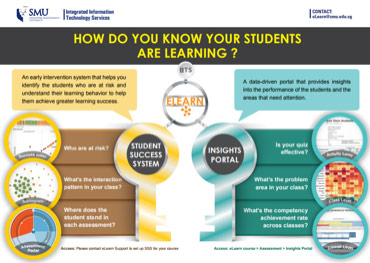 [Screenshot: IITS eLearn Analytic tools]
[Screenshot: IITS eLearn Analytic tools]
To support the university’s TEL strategy, IITS provides extensive platforms and tools. Faculty members are able to facilitate synchronous and asynchronous lessons, conduct examination and give feedback online, encourage peer collaboration, implement adaptive learning using data analysis, and many other methods of online instructional strategies and assessment.
Classroom Technologies
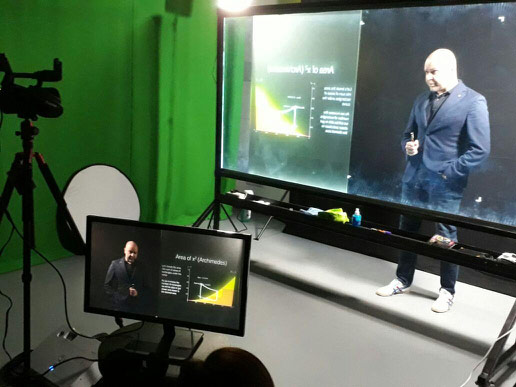 [Photo: Faculty member recording an online lesson using the learning glass]
[Photo: Faculty member recording an online lesson using the learning glass]
Technologies in the classrooms are fully integrated and designed to ensure ease of use and access. IITS staff partners with faculty members to implement technologies that will enhance instructional practices. Examples of innovations include self-service classroom recording facilities, learning glass, video conferencing facilities, Classroom Performance System for instant polling results, and Virtual Canvas for wireless projection of computer screens.
Emergency Preparedness for Teaching and Learning (EPTL) programme
The EPTL programme was initiated in 2015 to prepare and ensure that all faculty members are ready for online teaching and learning during emergency situations (e.g. SARS and haze). All faculty members are required to attend the EPTL pedagogical workshop where they will learn the techniques of designing and converting an in-class seminar to an online lesson using technology tools that enable active learning (e.g., WebEx video conferencing tool, online discussion forum etc.). Faculty members are required to implement a WebEx session each academic year.
MOE Tertiary Education Research Fund (TRF) Project
Faculty members have received the MOE funding for three projects, of which one is on TEL integration. The project "Learning Analytics on Student Feedback to Improve Teaching and Learning in Higher Education" (Lead PI: Assistant Professor Swapna Gottipati; PI: Professor Venky Shankararaman) aims to develop a web-based application to analyse students’ qualitative feedback on five main dimensions:
- Topics, which are various aspects of the course such as content and assessments, or teaching aspects such as delivery style, motivation, or friendliness
- Sentiments, which are positive or negative experiences with the corresponding topic from the student’s comment
- Suggestions, which provide actionable feedback to the decision makers such as administrators and instructors
- Time, with respect to a course over semesters or years
- Correlation between quantitative and qualitative data to give context to the quantitative measure
Catch Swapna and Venky at the MOE-TRF Project booth on Day 1 (20 Nov 2019) to find out more about this project!
The initiatives outlined here underscore SMU’s commitment to its Vision 2025 of providing a transformative education for a new generation of learners by leveraging the affordances of technology.
Do find out more about how SMU faculty members make meaningful impact in their teaching and learning practices at the following sessions:
Day 1 (1:30-3:30pm)
Breakout Session 1a: Scaling up 21st Century General Education through Technology
Susheela A. Varghese
Director
Centre for English Communication
Susheela will share CEC’s technology innovations e.g. Eli Review – a software tool designed by educators to promote better writing through better peer feedback and revision.
Breakout Session 1b: Transforming Higher Education Through Artificial Intelligence: Impact and Implications
Goh Yihan (Moderator)
Dean, School of Law
Associate Professor of Law
Director, Centre for AI and Data Governance
Lim Ee Peng
Professor of Information Systems
Director, Living Analytics Research Centre
Breakout Session 1c: Experiential learning: Evolving roles of educators
Gary Pan
Associate Professor of Accounting (Education)
Associate Dean (Undergraduate Admissions and Student Development)
Academic Director, SMU-X
Venky Shankararaman
Professor of Information Systems (Education)
Deputy Dean, Practice & Education
Day 2 (8:30-10:15am)
Breakout Session 2a: Defining Lifelong Learning from Different Perspectives
Dr. Lim Lai Cheng
Executive Director, SMU Academy
Breakout Session 2b: Blended learning: What’s next? Creating collaborative learning opportunities
Pascale Crama
Associate Professor of Operations Management
Academic Director, Blended Programmes
Academic Director, IE-SMU Master of Business Administration
Aarthi Sridharan
EdTech Project Manager & Programme Lead
Breakout Session 2c: Technologies to Prepare Learners for their Future Professions
Sungjong Roh
Assistant Professor of Corporate Communication
Alan Megargel
Assistant Professor of Information Systems (Practice)
Project Head, T-bank and Special Projects
Supervisor to SIS UG Instructors
Coordinator, BSc (IS) Financial Technology Track
